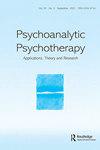自我药物治疗、创伤重演和分离:儿童创伤与药物滥用关系的精神分析视角
IF 1.2
Q1 PSYCHOLOGY, PSYCHOANALYSIS
引用次数: 0
摘要
摘要本文在自我药物治疗假说的框架下,探讨发展性创伤、分离和药物滥用之间的关系。通过展示一个临床小插曲,这篇文章说明了药物滥用是如何作为一种适应不良的应对策略来管理来自童年时期依恋关系中创伤经历的压倒性情绪。经历过发展性创伤的个体可能会分离负面依恋记忆及其相关情绪,从而导致其内部状态的分隔,阻碍其自我调节能力。在这种情况下,物质可以作为痛苦情绪的外部调节器,使这些人远离他们的创伤记忆,并促进他们采取无所不能和自力更生的态度。因此,对于临床医生来说,准确识别和解决这些个体的自我药物治疗需求是至关重要的。这是促进这些客户承认、探索和整合他们的痛苦记忆作为他们身份的内在元素的能力的基础,从而促进统一和有凝聚力的自我概念的发展。关键词:成瘾解离发育创伤自我用药假说披露声明作者未报告潜在利益冲突。其他信息资金作者报告说,没有与本文所述工作相关的资金本文章由计算机程序翻译,如有差异,请以英文原文为准。
Self-medication, traumatic reenactments, and dissociation: a psychoanalytic perspective on the relationship between childhood trauma and substance abuse
AbstractThis article explores the relationship between developmental trauma, dissociation, and substance abuse within the framework of the self-medication hypothesis. By means of presenting a clinical vignette, the article illustrates how substance abuse can serve as a maladaptive coping strategy for managing overwhelming emotions that stem from traumatic experiences in attachment relationships during childhood. Individuals who have undergone developmental trauma may dissociate negative attachment memories and their related emotions, which consequently leads to compartmentalization of their internal states and hinders their self-regulation abilities. In such scenario, substances can act as external regulators of distressing emotions, distancing these individuals from their traumatic memories and facilitating the adoption of an omnipotent and self-reliant attitude. Hence, it is of utmost importance for clinicians to accurately identify and address the self-medication needs of these individuals. This is fundamental in facilitating these clients’ capacity to acknowledge, explore, and integrate their distressing memories as intrinsic elements of their identity, thereby fostering the development of a unified and cohesive self-concept.Keywords: addictiondissociationdevelopmental traumaself-medication hypothesis Disclosure statementNo potential conflict of interest was reported by the author(s).Additional informationFundingThe author(s) reported that there is no funding associated with the work featured in this article
求助全文
通过发布文献求助,成功后即可免费获取论文全文。
去求助
来源期刊

Psychoanalytic Psychotherapy
PSYCHOLOGY, PSYCHOANALYSIS-
CiteScore
1.30
自引率
37.50%
发文量
22
期刊介绍:
Psychoanalytic Psychotherapy publishes original contributions on the application, development and evaluation of psychoanalytic ideas and therapeutic interventions in the public health sector and other related applied settings. The Journal aims to promote theoretical and applied developments that are underpinned by a psychoanalytic understanding of the mind. Its aims are consonant with those of the Association for Psychoanalytic Psychotherapy in the NHS (APP in the NHS) in promoting applied psychoanalytic work and thinking in the health care system, across the whole age range.
 求助内容:
求助内容: 应助结果提醒方式:
应助结果提醒方式:


